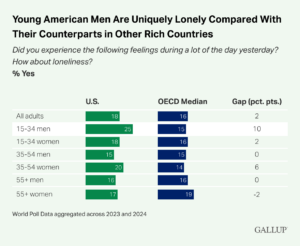Young men in the United States are facing a silent but deepening crisis of loneliness, with far-reaching implications not just for their wellbeing but also for the future of the workplace.
According to Gallup, American men aged 15 to 34 are more likely than their peers in other wealthy nations (and more than any other demographic group in the U.S.) to report feeling lonely.
According to aggregated findings from 2023 and 2024, 25% of young U.S. men said they felt lonely “a lot” the previous day, outpacing the national average of 18% and well above the 18% rate among young American women. This places them as an outlier among their peers in the 38 countries of the Organisation for Economic Co-operation and Development (OECD), where the median loneliness rate for young men is just 15%.
The U.S. Stands Alone
The United States shows the widest gap in loneliness between young men and the rest of the adult population among OECD nations. In contrast, most countries report roughly equal rates of loneliness across demographics, with some, such as Slovakia, Greece, and Colombia, even showing lower loneliness among younger men than among older adults.
In only two other countries, Iceland and Denmark, is young male loneliness higher than the general adult population.
A Workplace Under Pressure
The young men experiencing chronic loneliness today are the talent pool of tomorrow. Persistent emotional distress like loneliness and worry correlates strongly with reduced engagement, collaboration challenges, and poor mental health outcomes — all of which can affect productivity and workplace culture.
A workforce marked by disconnection and emotional strain is less likely to innovate, mentor effectively, or sustain healthy team dynamics. In extreme cases, unaddressed alienation can manifest as hostility, withdrawal, or resistance to organizational change, thus creating friction in increasingly diverse and collaborative work environments.
Emotional Strain Beyond Loneliness
The emotional burden on young American men goes beyond loneliness, Gallup reports. Over half (57%) report feeling stressed daily, compared with 48% of older adults. Daily worry affects 46% of young men, significantly more than the 37% of other adults in the U.S.
Notably, this worry gap does not exist in most OECD countries, highlighting another area where young American men are uniquely troubled.
Although young men report similar levels of enjoyment, anger, or feeling respected as other demographics, these higher levels of worry and loneliness point to a distinct strain that could be influencing their workplace performance, relationships, and long-term career development.
Why This Matters
Daily loneliness is tied to lower overall life satisfaction, decreased social trust, and fewer feelings of freedom and rest. Those who are lonely are far less likely to say they are “thriving” in life. This emotional disconnection can spill into professional environments, affecting morale, engagement, and the psychological safety of teams.
Moreover, rising loneliness among young men may compound existing societal concerns: this group is already more vulnerable to so-called “deaths of despair” (from suicide, drug overdose, and alcohol-related illness) and has lower rates of mental health help-seeking behavior compared to women. These patterns suggest that many are struggling in silence, even in professional settings.
A Call to Action for Employers
If unaddressed, this wave of loneliness could affect everything from retention and recruitment to team cohesion. As the workforce becomes more hybrid, automated, and socially fragmented, the need for emotionally healthy, connected employees is growing.


 Dr. Gleb Tsipursky – The Office Whisperer
Dr. Gleb Tsipursky – The Office Whisperer Nirit Cohen – WorkFutures
Nirit Cohen – WorkFutures Angela Howard – Culture Expert
Angela Howard – Culture Expert Drew Jones – Design & Innovation
Drew Jones – Design & Innovation Jonathan Price – CRE & Flex Expert
Jonathan Price – CRE & Flex Expert











